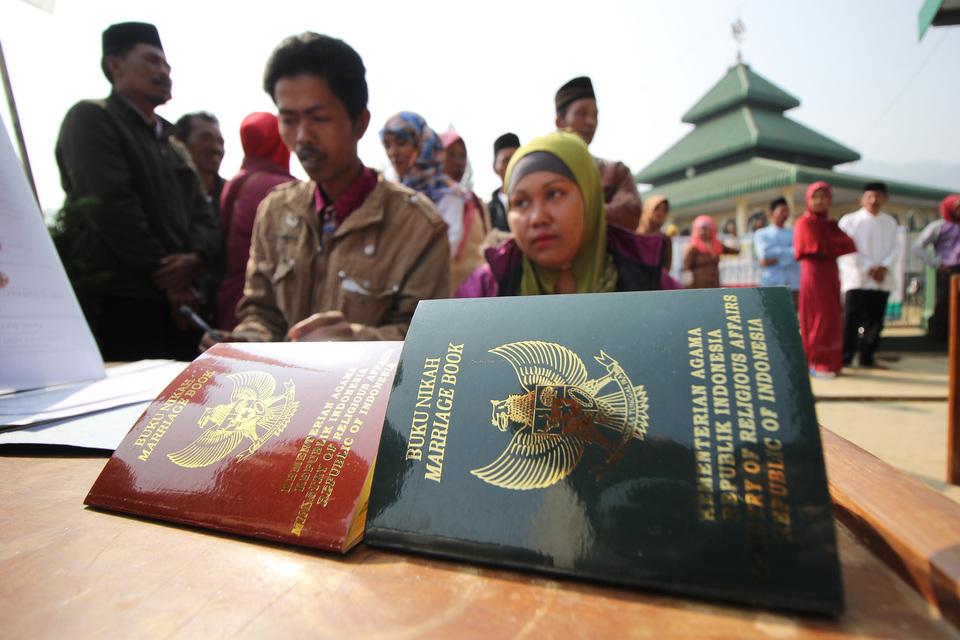W. Java Survey Finds 38% of Brides Are Children

Jakarta. No fewer than 38 percent of women in parts of West Java's Bogor district tie the knot before turning 18, a survey has found, with almost 8 percent of brides being under 15.
The research, by children's rights NGO Plan International and UK legal charity Coram Children’s Legal Centre (CCLC), was carried out in Bangladesh and Pakistan as well. In Indonesia, the surveyed subdistricts were Babakan Madang and Cigudeg, both located not far from Jakarta.
In their report, titled "Getting the Evidence: Asia Child Marriage Initiative," the researchers say that in all three countries, there is the widely shared belief that "having an age gap between husbands and wives is necessary for securing male dominance in the household" -- with a majority of respondents agreeing that "younger brides are preferable because they are more obedient and respectful of their husbands."
The Indonesian research found that 38 percent of married women did so before turning 18 and 7.8 percent were married even before they turned 15. However, only 3.7 percent of the sample of married men had married as children, and no men married under the age of 15, the report says.
Arranged or forced marriage in the predominantly Muslim subdistricts surveyed in Bogor was found to be relatively rare.
At the same time, Indonesian respondents said that unplanned pregnancy was one of the most significant and important drivers of child marriage.
In Bangladesh, meanwhile, the survey found an extraordinarily high proportion of women -- 73 percent -- were married as children. In Pakistan, that number stood at 34.8 percent but there the rate of girls married under 15 remained comparatively high at 15.2 percent. Many men in the areas surveyed in Pakistan also married young, with almost 13 percent of them reporting to have tied the knot before reaching adulthood.
Legal context
The Convention on the Elimination of all Forms of Discrimination Against Women, which was ratified by Indonesia in 1984, mentions that "the marriage of a child shall have no legal effect."
Separately, the UN Convention on the Rights of the Child (CRC), ratified by Indonesia in 1990, requires states to "take all effective and appropriate measures with a view to abolishing traditional practices prejudicial to the health of children" -- which includes marriage of people under the age of 18.
International law is also understood to require that the minimum age of marriage is the same for men and women.
In Indonesia, however, the 1974 marriage law allows 16-year-old girls to wed, while men have to wait until they are 19. Marriages under Islamic law, which are not officially registered, or based on other local customs, often see grooms -- but especially brides -- that are younger.
Earlier this year, Indonesia's Constitutional Court rejected a petition by women's rights activists to raise the legal age of marriage for women to 18, sparking calls on the government of President Joko Widodo to step in.
Education and opportunity
Plan International's director for Asia, Mark Pierce, says in a press statement that deeply ingrained gender discrimination is a main cause for child marriage, but he adds that economic factors, girls' economic dependence and tradition also play strong roles.
Lack of education and access to health services are also cited as factors contributing to the practice.
"Our research shows that changing communities’ attitudes and acceptance of child marriage is not a remote or insurmountable challenge," Pierce says, arguing that governments and community organizations can make a big difference.
"A combination of education, economic opportunity, access to health services, and more strict, enforced legal frameworks make a substantial difference to the levels of acceptance and prevalence of child marriage."
Tags: Keywords:POPULAR READS
Nissan to Make Next-Generation EV Batteries by Early 2029
Solid-state batteries are widely seen as the next step for EVs.Airlangga Set to Extend Leadership in Golkar After Election Success
Under his leadership, Golkar rose to the second position in the legislative polls and successfully made Gibran the elected vice president.Yellen Says Iran's Actions Could Cause Global 'Economic Spillovers'
Iran's missile attack on Israel early Sunday came in response to what it says was an Israeli strike on Iran's consulate in Syria.Takeaways from Prabowo's Responses to Legal Motion Contesting His Election Win
Part of the argument addresses the claim that the candidacy of Gibran Rakabuming Raka, Prabowo’s running mate, is unlawful.Prabowo Camp Cites ‘Procedural Error’ in Legal Challenge by Rival Candidates
The Constitutional Court's main task is to address alleged discrepancies in vote tallies, which neither of the plaintiffs challenged.Popular Tag
Most Popular






















